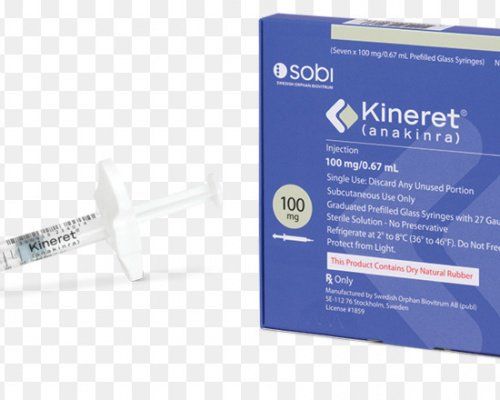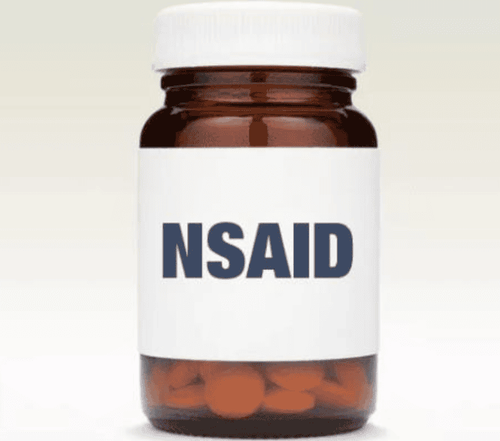This is an automatically translated article.
Non-steroidal anti-inflammatory drugs are a group of drugs that are widely used in clinical practice. The NSAID group has many different active ingredients, one of which is Aceclofenac in Acenac 100. So what does Acenac 100 do?
1. What does Acenac 100 do?
Acenac 100 is prepared in the form of film-coated tablets, in each tablet there are the following ingredients: Aceclofenac 100mg and excipients including Mannitol, Microcrystalline Cellulose, Povidon, Magnesium stearate, Sodium starch glycolate, Hydroxypropylmethylcellulose, Polyethylene glycol, titanium dioxide. Aceclofenac in Acenac 100 is an active ingredient in the group of non-steroidal anti-inflammatory drugs (NSAIDs) and is a derivative of phenylacetic acid. Aceclofenac has strong anti-inflammatory and analgesic effects through the mechanism of inhibiting the activity of the enzyme cyclooxygenase, thereby preventing the formation of an inflammatory mediator called Prostaglandin.Aceclofenac is well absorbed from the gastrointestinal tract and peak plasma concentrations are reached 1 to 3 hours after oral administration of Acenac 100. Aceclofenac is strongly bound to plasma proteins, has a plasma half-life of about 4 hours and is eliminated mainly in the urine.
2. Indications and contraindications of Acenac 100
Acenac 100 product is indicated for the purpose of pain relief and anti-inflammatory in pathologies such as osteoarthritis, rheumatoid arthritis and ankylosing spondylitis.
Acenac 100 drug product is contraindicated in the following cases:
Patients with hypersensitivity to aceclofenac or to the excipients contained in the drug; Acenac 100 is contraindicated in patients with existing or suspected duodenal ulcer or gastrointestinal ulcer; Do not use Acenac 100 for people with a history of duodenal ulcer or recurrent gastrointestinal tract; Contraindicated in patients with intestinal bleeding or other bleeding disorders; Acenac 100 is contraindicated in patients with moderate to severe renal impairment, history of bronchial asthma attacks, acute rhinitis, urticaria when using Aspirin or other NSAIDs.
3. Instructions for using Acenac 100
The usual recommended dose for adults is 2 Acenac 100 tablets per day, divided into 2 doses 12 hours apart. Patients need to take 1 Acenac 100 tablet after breakfast and the other after dinner.
Acenac 100 is not indicated for use in children. At the same time, avoid and preferably do not use Acenac 100 for pregnant and lactating patients.
Elderly: The pharmacokinetics of Acenac 100 are unchanged in this subject, so no dose adjustment and dosing interval are required.
Patients with mild to moderate hepatic impairment must reduce the dose of Acenac 100, the initial dose is indicated as 1 tablet per day or as directed by the doctor.
Symptoms of Acenac 100 overdose include hypotension, renal failure, seizures, gastrointestinal irritation and respiratory depression. When a patient overdoses with Acenac 100, the treatment is to quickly stop the absorption of the drug as soon as possible by gastric lavage and use of activated charcoal, then mainly supportive measures and symptomatic treatment. proof. Specific poisoning therapies such as mandatory diuretics, dialysis or hemodialysis are probably not effective in eliminating non-steroidal anti-inflammatory drugs (such as Aceclofenac) because of their high protein binding and complex metabolism. complex.
4. Side effects of Acenac 100
Common side effects of Acenac 100 :
Digestive disorders such as indigestion, abdominal pain, nausea; Allergic reactions include skin itching, rash, and urticaria. Some uncommon side effects of Acenac 100: Headache, dizziness, drowsiness.
Rare side effects of Acenac 100: Abnormal liver enzyme tests; Increased serum creatinine.
If any serious adverse events associated with Acenac 100 occur, the patient should discontinue the drug as soon as possible. Then quickly notify the doctor for appropriate treatment instructions.
5. Acenac 100 . Drug Interactions
Acenac 100 concomitantly with other non-steroidal anti-inflammatory drugs increases the risk of gastrointestinal ulceration and bleeding. Acenac 100 enhances the hypoglycemic effect of antidiabetic agents. Acenac 100 co-administration with oral anticoagulants poses a risk of major bleeding. Acenac 100 increases the concentration of drugs such as Lithium, Digoxin in the serum.
6. Be careful when using Acenac 100
Patients with cardiovascular disorders or mildly impaired renal function and elderly patients should be periodically monitored for renal function while taking Acenac 100 because Aceclofenac reduces renal function, and should be used at the same time. lowest possible dose. Hepatitis can occur without warning symptoms during the use of Acenac 100 . If liver function tests are abnormal or tend to worsen, clinical signs or symptoms of liver disease develop, or other abnormalities appear, the patient should immediately discontinue Acenac 100. Acenac 100 can lead to reversible inhibition of platelet aggregation. Acenac 100 should be used with caution when driving vehicles and operating machinery due to the risk of side effects such as headache, dizziness and affecting safety when performing the above tasks. Limit the use of Acenac 100 for pregnant and lactating patients.
Please dial HOTLINE for more information or register for an appointment HERE. Download MyVinmec app to make appointments faster and to manage your bookings easily.













